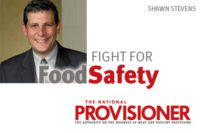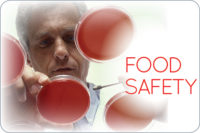
If you’ve not yet heard of E. coli O157:H7, you’ve likely never worked in the meat industry.
The pathogen, which resides in the intestines of healthy cattle, can contaminate beef carcasses during slaughter. If consumed by a human being, E. coli can attach to that person’s intestinal wall and produce toxins that attack the intestinal lining and blood cells. In rare instances, the resulting infection can cause sustained renal failure (also known as HUS) and even death.
The infectious dose for E. coli is also very small. It is theorized that as few as about 20 organisms can cause illness. E. coli is also very resilient, capable of surviving in extremely low temperatures. Given current technology, it remains impossible (with the exception, perhaps, of irradiation) to guarantee the elimination of E. coli from raw beef.
With that said, there are things we can do to reduce the risk significantly. Whether you run a slaughter or processing establishment, begin by encouraging a robust food-safety culture. It is not enough to simply proclaim that such a culture “exists.” Rather, employees must become personally and passionately committed the cause. And, this process must start with, and then flow without waver from the very top. If the officers of a company are not fully committed to food safety, middle management and the remaining workforce won’t be either.
Once you’ve resolved any existing food-safety cultural issues (easier said than done, I know), begin looking for opportunities to enhance food-safety training. Training should be informative but also effective. Single-page true-or-false questionnaires are the norm but may not be effective in explaining why food safety is so critical. Having defended HUS and death cases for more than 10 years, I have gained deep appreciation for the importance of robust employee training.
Next, empower your employees so each one understands that he or she is a food-safety officer. In turn, supervisors must remain acutely aware of what is happening on the production floor at all times. They must then be prepared to recognize and award employees who show initiative to affirmatively identify and correct deficiencies.
Thanks to you, we currently enjoy one of the safest food supplies in the world. But, we are also dealing with devastating pathogens that can impact product in any part of the food-processing environment. Consequently, it is up to each of us to do all we can, where we can, and when we can in the continuing battle against E. coli.



